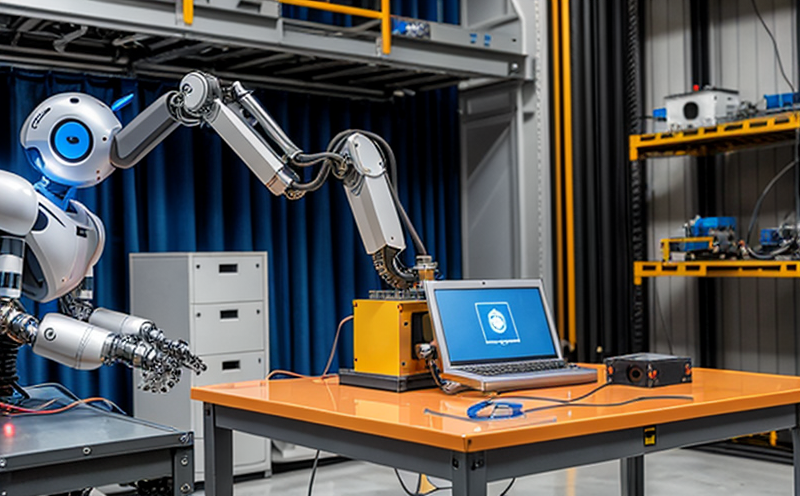UL 1741 Inverter Safety in Robotic Power Systems
The UL 1741 standard for inverters is pivotal in ensuring safety and compliance within the robotics sector. This standard is particularly important as it addresses the critical role of inverters in robotic power systems, where they convert direct current (DC) to alternating current (AC). Inverters are essential components that enable robots to operate efficiently by providing a stable and reliable supply of electricity.
The UL 1741 certification ensures that the inverter can withstand various environmental stressors without compromising its performance or safety. This is particularly crucial in robotic systems where reliability and precision are paramount. The standard covers not only the electrical characteristics but also the mechanical robustness, thermal stability, and operational integrity of the inverter.
In the context of robotics, compliance with UL 1741 ensures that the system can operate safely under a wide range of conditions, from sub-zero temperatures to high humidity environments. This is especially important for robotic systems deployed in industrial settings where continuous operation is required. The standard also addresses the safety implications of power surges and voltage fluctuations, which are common in complex robotics applications.
The testing process for UL 1741 certification involves rigorous evaluation of various parameters that could impact the safety and performance of the inverter. These include voltage withstand tests, overcurrent protection verification, harmonic distortion analysis, and stability under varying load conditions. The test setup typically includes a controlled environment where the inverter is subjected to these stressors for extended periods.
For R&D engineers working on robotic systems, compliance with UL 1741 is not just a regulatory requirement but also a critical step towards ensuring product reliability and safety. By adhering to this standard, they can develop products that meet the highest industry standards, thereby gaining competitive advantage in the market.
The importance of UL 1741 cannot be overstated for quality managers responsible for maintaining high standards within their organizations. Compliance with this standard ensures that the robotic systems are built to last and perform reliably under diverse operational conditions. This is particularly important in industries where downtime can lead to significant financial losses.
Why It Matters
The UL 1741 standard is crucial for the robotics sector as it ensures that inverters used in robotic systems are safe and reliable. This standard helps prevent potential hazards that could arise from electrical malfunctions, which can lead to accidents or equipment failures.
In a broader context, compliance with this standard contributes to the overall safety of workers and the environment. By ensuring that the inverters meet stringent safety requirements, companies can reduce the risk of electrical shocks, fire hazards, and other dangers associated with improper electrical components.
For R&D engineers, UL 1741 certification provides a benchmark against which they can evaluate their designs. It helps them identify potential areas for improvement and ensures that their products meet international safety standards. This is especially important in the rapidly evolving field of robotics where new technologies are constantly being introduced.
The standard also plays a vital role in enhancing the reputation of companies within the sector. Compliance with UL 1741 can be a key differentiator in the competitive market, helping companies to establish themselves as leaders in safety and quality.
Scope and Methodology
The scope of UL 1741 covers the design, construction, and performance of inverters used in robotic power systems. This includes both stand-alone units and those integrated into larger electrical systems. The standard ensures that these components are safe for use in various environments and applications.
- Environmental Conditions: Testing is conducted under a range of environmental conditions to ensure the inverter can function reliably across different climates.
- Electrical Characteristics: Verification of voltage ratings, current capacity, and efficiency under load.
- Mechanical Robustness: Assessment of the inverter’s ability to withstand mechanical stress without compromising its integrity.
- Thermal Stability: Evaluation of the inverter's thermal performance under various operating conditions.
The methodology for testing involves a series of rigorous procedures designed to simulate real-world operational scenarios. These tests are conducted using specialized equipment that replicates environmental and electrical stressors that the inverter might encounter during its lifecycle.
Environmental and Sustainability Contributions
- Eco-friendly Manufacturing Processes: By ensuring compliance with UL 1741, manufacturers can adopt more sustainable manufacturing processes that reduce waste and energy consumption.
- Energy Efficiency: The standard promotes the use of efficient inverters, which contribute to lower energy consumption and reduced carbon footprints.
- Extended Product Lifespan: Compliance with UL 1741 ensures that the inverter is robust and reliable, thereby extending its operational life. This reduces the need for frequent replacements, further contributing to sustainability.
The implementation of UL 1741 standards not only enhances safety but also promotes sustainable practices within the robotics sector. By adhering to these standards, companies can contribute positively to environmental conservation efforts.





